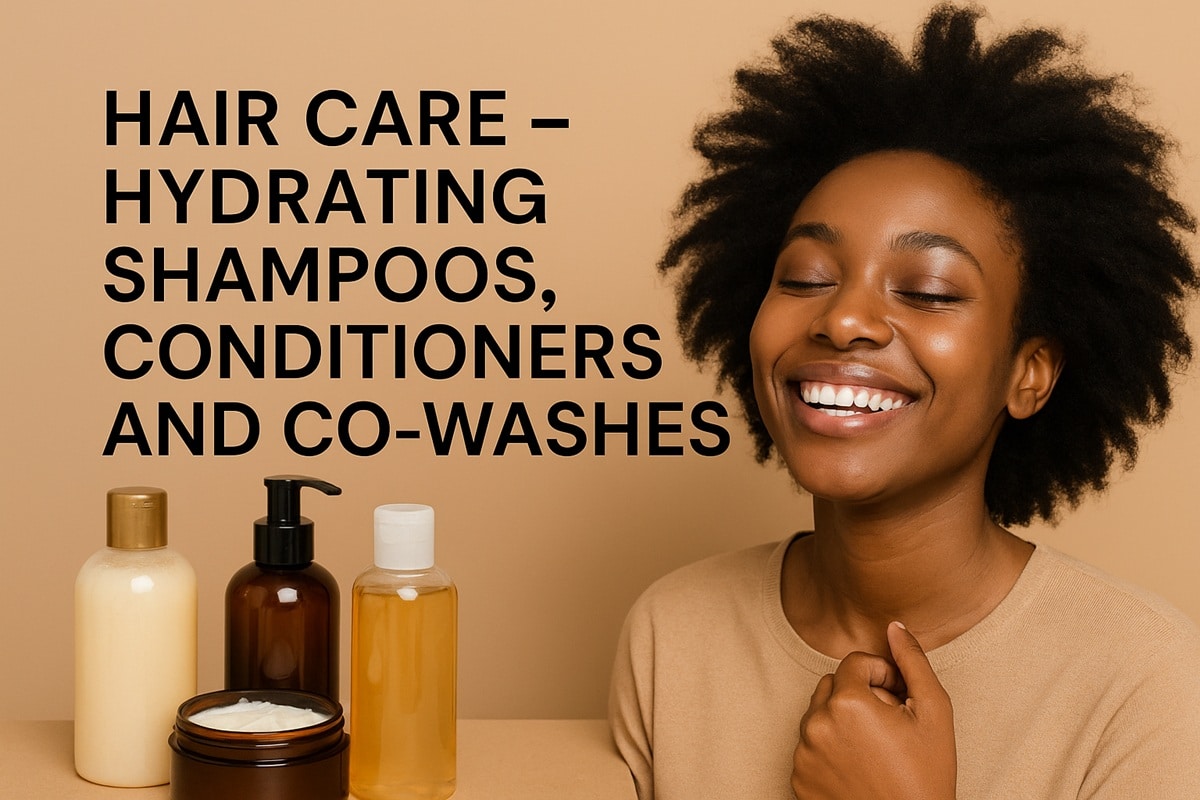Hair Care
Hair Care – Hydrating Shampoos, Conditioners, and Co-Washes
Hair Care – hydrating shampoos, conditioners and co-washes
Discover the ultimate guide to hair care for Nigerians and West Africans. From hydrating shampoos to co-washes, learn how to nourish your hair and scalp for healthy, radiant locks.
Hair Care – hydrating shampoos, conditioners and co-washes
Introduction
If you live in Nigeria or anywhere in West Africa, you know how challenging it can be to maintain healthy hair. The hot sun, humidity, dust, and occasional harsh chemical treatments can leave your hair dry, brittle, and prone to breakage. But it doesn’t have to be this way.
Taking care of your hair starts with choosing the right products. Hydrating shampoos, conditioners, and co-washes are not just trendy—they are essential for keeping hair moisturized, soft, and strong. In this guide, we’ll break down everything you need to know about proper hair care routines, scalp treatments, and styling essentials for Nigerians and West Africans.
Whether you have natural, relaxed, or chemically-treated hair, this guide will help you pick products that suit your hair type and lifestyle. By the end, you’ll know how to nourish your hair from root to tip, prevent damage, and enjoy soft, healthy hair every day.
Understanding Your Hair Type and Needs
Before buying any hair care products, it’s important to understand your hair type. West African hair comes in various textures—from tightly coiled kinks to loose curls and straightened strands. Knowing your hair type helps you choose products that give maximum hydration and protection.
Common Hair Types in West Africa:
- Type 4 (Kinky/Coily): Prone to dryness, shrinkage, and breakage.
- Type 3 (Curly): Needs moisture to reduce frizz and maintain curl definition.
- Relaxed/Straightened Hair: Vulnerable to heat damage and split ends.
- Chemically Treated Hair: Needs extra care with protein-rich conditioners and protective styling.
Common Hair Challenges:
- Dryness due to sun exposure and low humidity.
- Breakage from excessive manipulation or heat styling.
- Scalp issues such as itchiness, dandruff, or buildup.
- Frizz and tangles, especially in humid climates.
Understanding your hair type allows you to choose the right shampoo, conditioner, and co-wash, ensuring your hair remains strong and hydrated.

Hydrating Shampoos: What They Are and Why You Need Them
Hydrating shampoos are designed to clean your hair without stripping away natural oils. Unlike regular shampoos that can leave hair dry and brittle, hydrating shampoos lock in moisture, keeping your hair soft and manageable.
Key Ingredients to Look For:
- Aloe Vera: Soothes the scalp and adds moisture.
- Shea Butter: Provides deep hydration and reduces breakage.
- Coconut Oil: Strengthens hair and prevents dryness.
- Glycerin: Retains moisture in hair strands.
Benefits for Nigerian & West African Hair:
- Reduces dryness caused by heat and sun exposure.
- Improves hair elasticity and prevents breakage.
- Adds shine and smoothness for easier styling.
- Prepares hair for conditioning and treatment.
How to Use Hydrating Shampoo:
- Wet hair thoroughly.
- Apply a generous amount of shampoo and gently massage into scalp.
- Rinse thoroughly and follow with conditioner or co-wash.
- Avoid daily washing to prevent over-drying; 2–3 times per week is ideal.
Tip: Pair hydrating shampoos with scalp detox serums for the ultimate hair health boost.
Hair Care – hydrating shampoos, conditioners and co-washes
Conditioners: Unlocking Soft, Manageable Hair
Conditioners are essential for sealing in moisture after shampooing or co-washing. They make hair soft, reduce tangles, and prepare it for styling.
Types of Conditioners:
- Daily Conditioner: Light and suitable for regular use.
- Deep Conditioner: Rich in nutrients, used weekly for repair and hydration.
- Leave-in Conditioner: Provides continuous moisture throughout the day.
Ingredients That Nourish Hair:
- Argan Oil: Adds shine and reduces frizz.
- Shea Butter: Seals moisture and strengthens hair.
- Keratin: Repairs damaged hair strands.
How to Apply Conditioner:
- After shampooing, apply conditioner from mid-length to ends.
- Leave on for 5–10 minutes (deep conditioner: 15–30 minutes).
- Rinse thoroughly.
- For leave-in conditioner, apply to damp hair and comb through for even distribution.
Conditioners complement shampoos and co-washes by keeping your hair hydrated and manageable, reducing tangles and split ends.
Hair Care – hydrating shampoos, conditioners and co-washes
Co-Washes: Gentle Cleansing for Natural Hair
Co-washing, short for conditioner washing, is perfect for natural or chemically-treated hair. Instead of using shampoo, you cleanse your hair with a hydrating conditioner.
Benefits:
- Preserves natural oils in your hair.
- Reduces dryness and breakage.
- Maintains curl definition and smoothness.
- Gentle on the scalp, preventing itchiness and irritation.
How to Co-Wash:
- Apply co-wash to wet hair and scalp.
- Massage gently for 2–3 minutes.
- Rinse thoroughly.
- Follow with a leave-in conditioner or oil for added moisture.
Tip: Pair co-washing with detox scalp serums to remove buildup and keep your scalp healthy.
Essential Hair Care Products Beyond Washing
While shampoos, conditioners, and co-washes are foundational, other hair care products help maintain healthy hair.
Hair Oils:
- Nourish the scalp and strands.
- Popular oils: jojoba, coconut, argan, castor.
- Apply lightly to ends or scalp for hydration.
Heat Protectants:
- Protect hair from blow-drying, flat-ironing, or curling.
- Prevents breakage and split ends.
Multipurpose Styling Products:
- Creams, gels, and leave-in treatments.
- Keep hair soft, define curls, or maintain styles.
Layering Products Correctly:
- Shampoo or co-wash.
- Conditioner or deep treatment.
- Leave-in conditioner.
- Hair oil or serum.
- Styling products and heat protectants.
Tip: Using the right combination prevents dryness, breakage, and scalp issues.
Hair Care – hydrating shampoos, conditioners and co-washes
Hair Care Routine for Different Hair Goals
Moisture-Focused Routine:
- Hydrating shampoo → leave-in conditioner → hair oil.
- Best for natural, curly, or dry hair.
Strength-Focused Routine:
- Protein-rich conditioner → scalp serum → minimal heat styling.
- Ideal for chemically-treated or heat-styled hair.
Styling-Focused Routine:
- Hydrating shampoo → leave-in → multipurpose styling product → heat protectant.
- Suitable for people frequently styling hair.
Customizing your routine ensures hair remains healthy, hydrated, and strong while reducing damage and frizz.
Scalp Health: The Foundation of Great Hair
Healthy hair starts with a healthy scalp. Ignoring scalp care can lead to dandruff, itchiness, and hair thinning.
Benefits of Scalp Care:
- Stimulates hair growth.
- Prevents buildup and follicle blockage.
- Improves hair texture and shine.
Best Ingredients for Scalp Health:
- Tea tree oil: anti-inflammatory and antifungal.
- Peppermint oil: improves circulation and refreshes the scalp.
- Aloe vera: soothes irritation and moisturizes.
Tips:
- Massage scalp 2–3 times a week.
- Use scalp serums after washing for hydration.
- Detox scalp once a month to remove buildup.
Common Mistakes to Avoid
- Overwashing or underwashing: Can cause dryness or scalp buildup.
- Wrong product for hair type: Leads to breakage, frizz, or limp hair.
- Excessive heat styling: Use heat protectants to prevent damage.
- Skipping conditioner or co-wash: Leaves hair dry and brittle.
- Harsh chemicals: Avoid sulfates and parabens that strip moisture.
Tip: Always read product labels and choose products suitable for your hair type.
Hair Care – hydrating shampoos, conditioners and co-washes
Types of People Who Need Hair Care Products in Nigeria & West Africa
- Busy Professionals: Sun and pollution exposure dries hair.
- Students & Young Adults: Experimenting with hairstyles, need hydration and protection.
- Natural Hair Enthusiasts: Require moisturizing shampoos, conditioners, and co-washes.
- Chemically-Treated or Heat-Styled Hair: Benefit from protein treatments, heat protectants, and oils.
Even though this guide focuses on hair, body care is also important. Using proper body washes alongside hair care ensures complete self-care.
How to Choose the Best Hair Care Products Online
Shopping online can be tricky. Here’s how to find the right products on Nigerian platforms like creams.ng:
- Check Product Reviews: Learn from other buyers’ experiences.
- Read Ingredients Carefully: Avoid harsh chemicals; look for hydrating and nourishing elements.
- Trust Verified Sellers: Ensure authenticity and quality.
- Compare Prices and Promotions: Get value without compromising quality.
Tip: Creams.ng offers a wide selection of hydrating shampoos, conditioners, co-washes, hair oils, and styling products suitable for all hair types.
Conclusion & Call to Action
Hydrating shampoos, conditioners, and co-washes are essential for healthy, strong, and beautiful hair. By understanding your hair type, choosing the right products, and following a proper routine, you can prevent dryness, breakage, and scalp issues.
Take care of your hair today—invest in products that nourish, protect, and enhance your natural beauty. Explore the full range of hair care products on creams.ng and give your hair the attention it deserves!
Hair Care – hydrating shampoos, conditioners and co-washes

